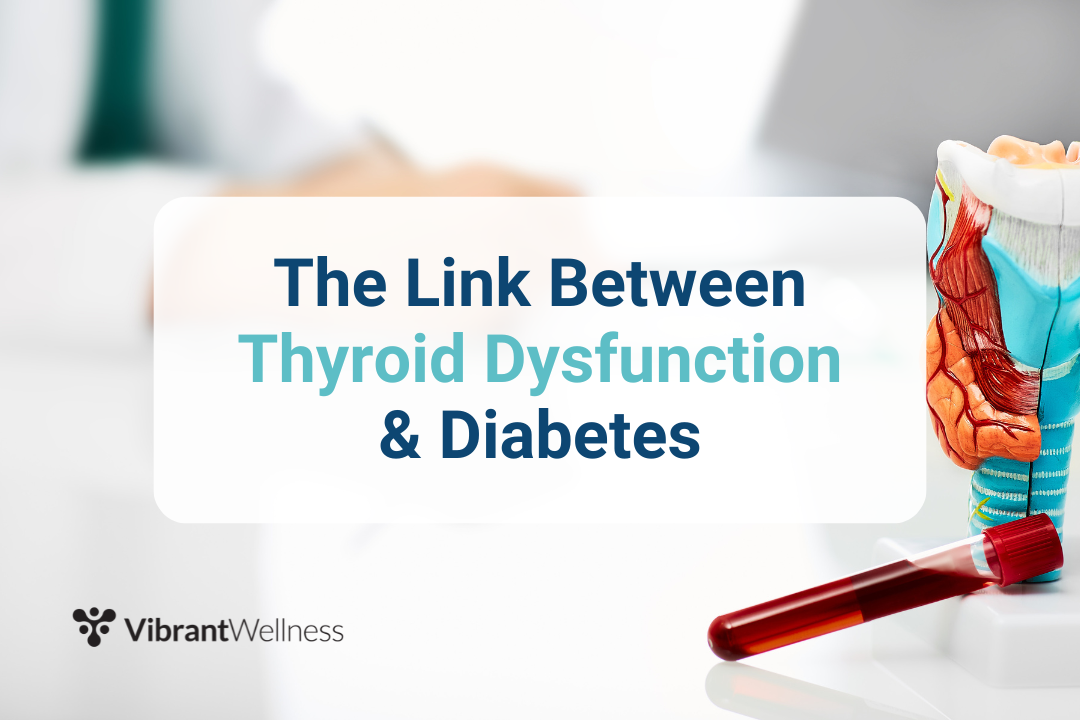Research Spotlight: Anti-TPO as an Early Predictive Marker in Thyroid Disease
Thyroid disorders are some of the most common diseases worldwide, with approximately 20 million people suffering in the United States alone.
However, many with the condition go undiagnosed because symptoms develop gradually and are nonspecific.
This can cause serious damage to the body over time as the thyroid impacts various major organ systems, like the heart.
In this article, we’ll explore the value of anti-TPO as an early predictive marker of thyroid disease and how testing for the antibody, alongside other relevant markers, can help predict, diagnose, and inform treatment for thyroid disorders, ultimately leading to better health outcomes.
The Influential Role of the Thyroid

The thyroid, an endocrine gland responsible for producing and secreting thyroid hormones, regulates processes like respiration, heart rate, and reproductive function, to name a few.
It affects virtually every body system, typically enhancing function and metabolism.
Thyroid problems can negatively impact many body systems, causing weight fluctuations, neurological symptoms, or gastrointestinal issues.
When the thyroid is functioning properly, it secretes the appropriate amount of the thyroid hormones triiodothyronine (T3) and thyroxine (T4), driven by the thyroid-stimulating hormone (TSH) synthesized by the pituitary gland.
Any disruptions to this feedback loop can have damaging effects on the body—including thyroid disorders, which affect 5% to 6% of the US population.
Thyroid Disease Development & Dangers

Thyroid disorders occur when the thyroid gland is impacted or is not functioning correctly. Since the thyroid gland is responsible for producing thyroid hormones, any dysfunction in the gland can cause hormonal imbalance, impacting a wide range of mechanisms in the body.
Common thyroid disorders include:
- Hypothyroidism: reduced thyroid hormone production
- Hyperthyroidism: excessive thyroid hormone production
- Hashimoto’s disease: an autoimmune condition that causes hypothyroidism
Hyperthyroidism and hypothyroidism can affect the nervous system and play a role in the development of dementia.
Thyroid disorders are particularly dangerous for pregnant women as subclinical hypothyroidism, and the presence of thyroid autoantibodies during pregnancy, can adversely affect the survival of the fetus and are linked to hypertension and toxemia.
One central system at risk of damage from thyroid conditions is the cardiovascular system.
Hypothyroidism can make the heart weaker and less efficient. This can lead to a slower heart rate, harder blood vessels, and less flexible arteries, which can cause issues with the heart and blood vessels.
Thyroid conditions can also impair cardiac muscle relaxation, slowing the rate and amount of blood pumped with each heartbeat. This can lead to heart failure.
Additionally, some studies show that thyroid disease is associated with abnormalities in lipid profiles and cardiac function.
If left untreated, thyroid disorders can increase the risk of heart disease and stroke, as well as osteoporosis, eye problems, and more.
Anti-TPO as an Early Predictive Marker
"Significance of Anti-TPO as an Early Predictive Marker in Thyroid Disease” is a 2019 study published in Hindawi, Autoimmune Diseases.
Researchers tested 4581 healthy individuals for various thyroid markers over two years, including TSH, FT4, anti-TPO, and anti-Tg.
The tested markers have the following functions:
- Thyroid-stimulating hormone (TSH) is produced by the pituitary gland and is responsible for regulating the thyroid’s production of its two major hormones: thyroxine (T4) and triiodothyronine (T3)
- Free T4 hormone (FT4) is the free or unbound version of the major thyroid hormone T4. Unbound T4 can enter cells and affect metabolism
- Antithyroid peroxidase (anti-TPO) is an antibody that attacks an enzyme involved in thyroid hormone production
- Antithyroglobulin (anti-Tg) is an antibody which attacks thyroglobulin, a protein involved in thyroid hormone production
Researchers split the individuals tested into two groups:
- Those with initially normal thyroid functioning that converted to hypothyroidism over time.
- Those with normal function that converted to hyperthyroidism.
The Results
The results demonstrated that 73% of the individuals from group one (hypothyroidism) had anti-TPO in their systems 252 days (± 33 days) before the onset of thyroid dysfunction.
Additionally, 68.6% of those from group two (hyperthyroidism) had the antibody in their systems 277 days (± 151 days) before any onset of thyroid dysfunction.
These results show that anti-TPO appears in the body before the first signs of thyroid hormone disruption.
So, what does this mean?
Testing patients for anti-TPO, alongside other well-known thyroid health markers like TSH, would significantly help identify individuals who could be at risk of developing thyroid disorders and prevent long-term symptoms and damage.

Early Intervention & Diagnostic Testing
Like many ailments, detecting thyroid disorders early on is beneficial for reducing the negative impact of the disease and preventing further damage.
For thyroid disorders specifically, it is easy for symptoms to get overlooked as they are nonspecific and develop gradually.
The presentation of thyroid-related symptoms can also vary significantly across patients.
It’s extremely helpful to catch thyroid disorders early on because, if left untreated, conditions like hypothyroidism can have serious body-wide adverse effects.
Some studies show that early treatment of thyroid diseases, especially for subclinical hypothyroidism, could help prevent the development of overt hypothyroidism.
Additionally, early intervention can help prevent damage to other systems. For example, early correction of lipid profiles can help prevent thyroid-induced cardiovascular damage.
The best way to pick up on early signs of thyroid disease is through diagnostic testing like Vibrant America’s Thyroid panel.

The Thyroid panel detects key markers involved in thyroid function, including:
- T3 - Triiodothyronine
- T4 - Thyroxine
- Free T3
- Free T4
- TSH
- Anti-TPO
- Reverse T3
- Anti-TG
By detecting early predictive markers of thyroid disease like Anti-TPO, alongside major thyroid hormones like TSH and FT4, you can help diagnose your patients earlier, prevent the spread of thyroid dysfunction to other body systems, and see improved outcomes.
Thyroid Function & Optimal Health
The thyroid gland plays a role in almost every body system. Thus, monitoring this system is crucial for maintaining optimal health.
By testing for markers of thyroid dysfunction, especially predictive markers like Anti-TPO, you can stay one step ahead of thyroid disease and protect your patients from major damage.
In the same respect, because symptoms of thyroid dysfunction can be vague and easily go undiagnosed, assessing the thyroid may reveal the root cause of a wide range of patient symptoms and begin the path to healing.
“Significance of Anti-TPO as an Early Predictive Marker in Thyroid Disease”
About the Author: Hari Krishnamurthy is the Director of Biomedical Engineering at Vibrant Labs. He strives to use his background in semiconductors and microchips to make a meaningful impact on healthcare.
Regulatory Statement:
The general wellness test intended uses relate to sustaining or offering general improvement to functions associated with a general state of health while making reference to diseases or conditions. This test has been laboratory developed and its performance characteristics determined by Vibrant America LLC and Vibrant Genomics, a CLIA-certified and CAP-accredited laboratory performing the test. The lab tests referenced have not been cleared or approved by the U.S. Food and Drug Administration (FDA). Although FDA does not currently clear or approve laboratory-developed tests in the U.S., certification of the laboratory is required under CLIA to ensure the quality and validity of the test
 By
By




